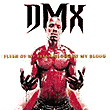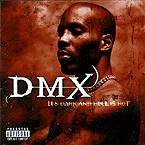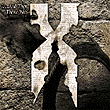 |
Album
Review
|
|
|
 Flesh
of My Flesh, Blood of My Blood, DMX Flesh
of My Flesh, Blood of My Blood, DMX
(Def Jam)
About As Primal As It Gets ...
Guest appearances by Mary
J. Blige, The Lox and Jay-Z.
By Kembrew McLeod
Sporting the bloodiest
album cover since punk-pranksters The Dwarves' Blood, Guts
& Pussy, or any Unsane album for that matter, Flesh
of My Flesh, Blood of My Blood's cover art sets the tone for
an hour's worth of hardcore beats and grisly imagery.
The first song, "Bring
Your Whole Crew," (RealAudio excerpt) opens with a blood-curdling
scream by DMX and the line, "I got blood on my hands/ and there's
no remorse/ I got blood on my d--k/ 'cause I f--ked a corpse."
With this opening salvo, we know he isn't taking us on a tour
of Mr. Rogers' neighborhood but, rather, the horrifying 'hood
inside his head.
| In an album so "real,"
bleak and humorless, one begins looking for humor
where DMX didn't intend it. |
|
|
.gif) |
In fact, it is those first few seconds of "Bring Your Whole Crew"
that accent both what's right and what's wrong with the album.
Produced by PK of DMX's in-house Ruff Ryders production team,
the song's beats are solid, but DMX's over-the-top lyrics -- with
their ridiculousness compounded by his unhinged, raspy delivery
-- often paint him into the dreaded corner of self-parody. After
leafing through the booklet (featuring DMX lounging in a bathtub
full of blood, as well as other shots of him covered in blood,
blood and more blood) and hearing his "reality"-obsessed lyrics
("so I paint the walls with his blood/ another d--k in the mud,"
etc.), the shock value wears off and the album quickly becomes
about as dynamic as refrigerator-hum white noise. And that's just
song #1.
Nevertheless, Flesh ... is pretty consistent for a late-'90s,
New York-centric, hardcore hip-hop album, a genre that (with a
few significant exceptions) has been pretty colorless for the
past few years. As I said, the beats are solid and his delivery
is sharp throughout, particularly on songs like "Slippin'," "Ain't
No Way" and the spiritual "Ready
To Meet Him." (RealAudio excerpt).
But in an album so "real," bleak and humorless, one begins looking
for humor where DMX didn't intend it. The most unintentionally
funny song since a lethargic Puffy and Mase rewrote "The Message"
during a clinical experiment (to see what it would sound like
if people rapped in their sleep) is DMX's "The Omen."
"The
Omen" (RealAudio excerpt) opens with an overwrought skit
that sounds like Chris Rock pretending he's a woman praying for
a dying friend ("he's not ready to die! ... he's going to take
him from us!"). Then, when the scary, skeletal beats begin, DMX
starts barking like a dog (I know this is his trademark, but c'mon,
this has got to be stupider than Master P's sounds-like-he's-constipated
"Uuunnnggghhhhh"). The song, it turns out, is a bizarre dialogue
between DMX and the Devil. Since no one else is credited as the
guest MC on this track, I'm assuming DMX changes his voice to
impersonate the devil, but surprisingly, seeing as how his own
voice is pretty mean-sounding, he doesn't play a very threatening
devil. In fact, this "devil" sounds quite a bit like Cartman from
"South Park." Despite the farcical delivery, the production does
a good job of conveying a mood with its minimalist drum track
and spooky organ, though the serious mood is torpedoed with a
campy, whispered version of the "Halloween" stalking mantra, "kill
kill kill kill ahh ahh ahh ahh." The cherry on this silly Sabbath-bloody-Sabbath
sundae is Marilyn Manson, the ultimate comic foil, who growls
the goofy chorus, "the snakes, the rats, the cat, and the dog/
How you gonna live when you're in a fog?"
Huh?
These melodramatic moments,
in conjunction with the blood-soaked album art, make it hard to
take DMX seriously, which is a shame, because songs like "Ready
to Meet Him" demonstrate that he can, on occasion, be an artist
of depth and nuance. But if DMX continues in the trajectory his
career has taken, it's more likely that he'll be remembered as
a mere novelty act.
|
| |
|
 Its
Dark And Hell Is Hot, DMX Its
Dark And Hell Is Hot, DMX
(Def Jam)
You Could Do Worse, But You Could Do Better
By Kembrew McLeod
DMX is being
hyped as the newest kid in town, but he'll remind you that he's
actually been around for a while (though not long enough to be
a rechristened Davy DMX, that stupid-fresh DJ who brought you
the 1984 breakdancin' staple, "One for the Treble").
On paper, the list of DMX's positive points is impressive: 1)
He's been around the block, rhyming for a dozen or so years, and
it shows. 2) His delivery is about as unique as you can get in
this day and age -- somewhere between the sing-songy cadence of
Willie D and the in-your-face barking of Busta Rhymes. 3) His
rhymes have substance and he's a serious dude, having spent many
a day contemplating the raw, rough reality of his life (as he
reminds us on "Get At Me Dog"). 4) His production is on-point.
From the string-laden, darkly textured beats on "Intro," to the
bass-driven cacophony of "Fuckin' Wit' D," to the gothic for-whom-the-bell-tolls-church-bell-ringy-dingys
and horror movie woo-woo atmospherics of "For My Dogs," the sounds
that prop up DMX's voice certainly don't waste the listener's
time.
| "At times he's really
good. Unfortunately, he's not great." |
|
|
.gif) |
DMX is good. At times he's really good. Unfortunately,
he's not great. And in this saturated hip-hop market, that means
he'll be resigned to being just another player -- a trivia question
10 years down the line, kind of a Gerry & the Pacemakers,
Foo Fighters or the Tubes of hip-hop. So, yeah, DMX is hip-hop's
newest star -- this album entered the Billboard 200 albums
chart at #1 -- and he deserves all the street cred that he has
accumulated. But hype and integrity are rarely the ingredients
that make for a great artist.
Hip-hop junkies who hold their
breath every Tuesday waiting for the next fix probably own this
album. If you like your hip-hop and have some extra dead presidents
to lay down, you could do worse than It's Dark And Hell Is
Hot. But nothing on this album contains earth-shattering echoes
of the future, nor does the album rattle you to your bones, making
you experience every second of the present. It's just good.
|
| |
|
 ...
And Then There Was X, DMX ...
And Then There Was X, DMX
(Def Jam)
His Name Is ...
"D-X-L" features the Lox.
By Trent Fitzgerald
On his latest
journey into hell, And Then There Was X, DMX pitches grimy
rap to the stop-and-go computerized beats, choppy basslines, orchestral
strings and spirited keyboard melodies of Ruff Ryders' in-house
producers. His latest single, "What's My Name," is a heated response
to Kurupt's dis "Callin' Out Names." On another track, "Party
Up," DMX is heard warning naysayers, "Y'all gonna make me act
a fool up in here."
This is DMX's third album in two years. It's Dark and Hell
is Hot and Flesh of My Flesh, Blood of My Blood, both
released in 1998, attracted attention for their radio-friendly
sound, hardcore lyrics and DMX's throaty, sinister delivery. With
And Then There Was X, the rapper doesn't miss a beat in
continuing on his gangsta rampage. There are sinister street narratives
about robbing stores ("One More Road to Cross" (RealAudio
excerpt)) and getting rid of back-stabbers ("The Professional").
And on the solemn "Here We Go Again" (RealAudio
excerpt), DMX assumes the character of a "fatherly" outlaw
who describes his thoughts about ending a young drug dealer's
life. "More 2 A Song" (RealAudio
excerpt) is a critique of the notion that flashy jewelry
and clothes will win love and respect on the streets. Lines such
as "Niggas walk around frontin', talkin' about jewels/ How much
y'all bust tools/ Y'all sound like fools" might demonstrate that
DMX isn't obsessed with becoming a glitzy hardcore rapper and
would rather embrace his ghetto-centric values (Hey Puff Daddy,
are you listening?). Then again, who knows, he could just
be frontin'.
| Then again, who knows,
he could just be frontin'. |
|
|
.gif) |
On "Angel," DMX demonstrates his understanding of an important
motto from rapper Rakim ("It ain't where you're from, it's where
you're at"), as he refuses to accept the notion that, once you've
left the ghetto, you'll forget where you came from. In this song
he speaks to God about his struggles with such feelings. Much
of what DMX raps about on this album appears to be heartfelt,
though he does run out of steam toward the end of the disc. Nevertheless,
DMX's chronicle of his trek through hell and back is likely to
satisfy fans.
|
| |
|